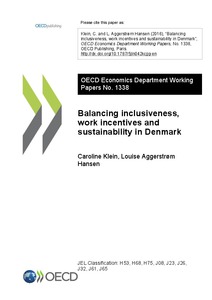Balancing inclusiveness, work incentives and sustainability in Denmark
"The generous Danish welfare state relies on a high degree of labour force participation both for financing and in order to ensure social cohesion. This underlines the need for getting work incentives right and improve the employability of vulnerable groups of workers, in particular migrants. M...
| Main Authors: | , |
|---|---|
| Institution: | ETUI-European Trade Union Institute |
| Format: | TEXT |
| Language: | English |
| Published: |
Paris
2016
OECD |
| Subjects: | |
| Online Access: | https://www.labourline.org/KENTIKA-901512472979-Balancing-inclusiveness,-work-.htm |
| Summary: | "The generous Danish welfare state relies on a high degree of labour force participation both for financing and in order to ensure social cohesion. This underlines the need for getting work incentives right and improve the employability of vulnerable groups of workers, in particular migrants. Many benefit recipients also face high marginal tax rates for returning to work, creating a barrier for inclusion. Likewise, as the population ages, the need for longer working lives becomes a central aim. In Denmark, much has been done to keep older workers in the labour market, but there is further scope for reducing barriers to work for this group, including through the design of the pension system. Cost pressures at social institutions could be addressed by better reaping the effects on municipal reform, more coordination between different service providers, and open the market for social services, for instance old age care, for private suppliers under a strict quality monitoring framework." |
|---|---|
| Physical Description: | 42 p. Digital |

